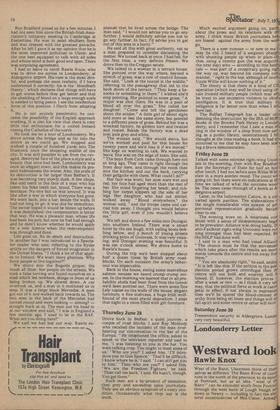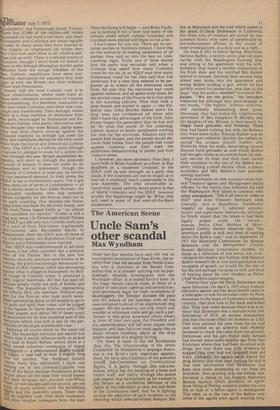Westward look
Rawle Knox
West of the Bann. Ulstermen think of the selves as different. The Bann River of cowl' runs in the north of the province, to its motP at Portrush, but as an idea "west of th,: Bann " can be eXtended south from Portrus'; through the west bank of Lough Neagh arl°1 down to Newry — including in fact the elec, toral constituencies of Mid-Ulster, Armagil
ondonderrv and Fermanagh-South Tyrone. here live 27,000 of the million-odd voters egistered for last week's elections, and there Protestants and Catholics are about equally divided. In many areas they have learned to ,ive happily as neighbours (in others they on't live with each other at all, which is per' aps just as well). There is a limited extent of tolerance, thought I don't think I'd stretch it down to the Armagh-Monaghan border, quite different from the savage tribalism of the east. Catholic republicans have more consistently maintained the argument that their fight is with the British, not their ordinary fellow Irish Protestants.
Nearly half the total Catholic vote is in these constituencies, where there have alWays been vehement accusations of Unionist gerrymandering. It's therefore instructive to see how these Catholics used their new vote, 1
, single and transferable. Take Armagh, where Ithere is a long tradition of abstention from the polls, encouraged by Nationalist and RePublican Parties, who partly objected to elections because they were British, partly knew Ithey had little chance anyway against the Unionist machine. In Armagh last week the only two candidates elected on the first count , Were from the Social and Democratic Labour ` Party. The SDLP is a Catholic party (though i it denies it), pledged to work for a united Ireland through the new, British-established Assembly, and more so through the proposed 1Council of Ireland. It does not insist on an irOmediate end to internment, though the majority of Catholics at least pay lip service to this emotional demand. In Irish terms, the SbLP is not a revolutionary party. Yet it got ,i three seats out of seven in Londonderry — all 1 the catholic seats in fact. Eddie McAteer, the Nationalist candidate, who has certainly i shown sympathy for the Provos, went out in ! the early counting. (For decades the Nationalist Party has been the McAteer family, and ' The Irish Times tipped Eddie as "an almost sure candidate for election." Dublin is still a i?ng way away.) In Fermanagh-South Tyrone tne SDLP got the only two Catholic seats (out. 01 a total of five). Mid-Ulster, traditionally anti-Unionist, sent Bernadette Devlin to Westminster. Here the SDLP won all three of C Catholic seats; two Republican Club candidates and a Nationalist were rejected.
The SDLP was underestimated in advance because it has often sounded like a political echo of the Provos. But in the past few , rflonths, once the elections were known to be ' coming, the party has strongly denounced in 1 '. stances of IRA violence, while also protesting ,gainst what it alleges is harassment by Brit, h troops in Catholic areas. It produced a 1ail-1y logical manifesto. All this has paid off LL'ocause people really are sick of bombs and , ,u,ttllets. The Republican Clubs, representing 'le Official IRA, are nowhere. Political supOort for the Provos, who took much newsPer advertising space to tell people to go to Lite polls and spoil their votes, can be judged L'Y the figures. In Derry there were only 1,700 s,Poiled papers, and about 700 of these could ue accounted for by that muddled part of the .lectorate which was still at sea on the perPloxities of the single transferable vote. 1,, Balloting of course stuck to the same old s'Llits. The municipal elections last month had own that it would. Alliance early on picked Pa seat in South Belfast, where there is a 1 i°1id, mixed suburban community of liberal 1 .Ittelligence — a phenomenon almost unbilie ulster — and had to wait a mighty long 11,e for another. The Northern Ireland TI-anour Party was obliterated. I have said
:thing yet of the Unionist/Loyalist vote
t. eSt of the Bann because Protestants picked just about all the seats they would expect pd their divisions into pro-and anti-White r(.4Per, or not-too-pro and not-so-anti, are not zt
., i IIV of much interest until the politicking ,)(., •
wf,Irls and the Assembly meets. There they 411 sit together with their more numerous, ncl often tougher colleagues from the east.
Then the fixing will begin — and Brian Faulkner is nothing if not a fixer; and many of the colours under which various Unionists and Loyalists were elected will begin to run a bit.
I have news for you too. There are no sectarian parties in Northern Ireland. I have this on the authority of leading spokesmen of all parties; they said so into the box on votecounting night. Every one of them denied that his party was sectarian and when a Unionist was asked how many Catholics voted for his lot, or an SDLP man how many Protestants voted for his, they said that was irrelevant. For a time they seemed to be perplexed as to where all the bitterness came from. All said that the electorate had voted against violence, and all spoke truly there, for the spoiled votes of the Provos lie in tiny piles in the counting stations. Then they took a deep breath and started in again — like Kilkenny cats. John Brooke looked down his long nose and condemned all those who didn't have the advantages of his birth. John Hume forgot the generosity that he has and let fly with the snarls of the underdog. Labour, beaten to death, prophesied nothing but woe for the survivors. Alliance said the people had chosen, and the people would discover their follies. Sure the people had voted against violence, and here were the politicians demonstrating in public just how violence arose.
I, however, am more optimistic than they. I have faith in Brian Faulkner as a fixer, in Roy Bradford as a moderate Unionist; in the SDLP, with its new strength, as a party that °could, if the Unionists are not so stupid as to lean on it overhard, reach compromise in the new Assembly. The only conceivable alliance that could usefully share power is that of liberal Unionists and the SDLP, however prickly the beginnings 'might be. What they will need is some of that west-of-the-Bann moderation.













































 Previous page
Previous page